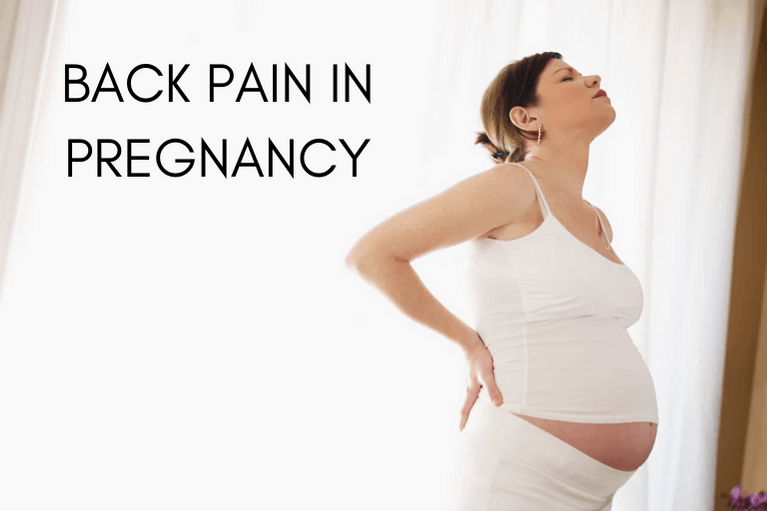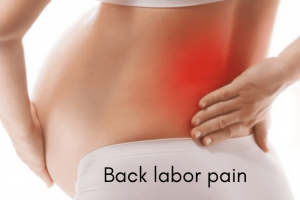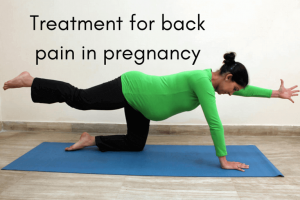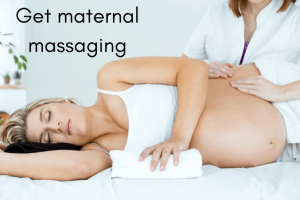Back Pain In Pregnancy – Causes, Treatment, And Prevention

Along with fatigue, nausea, and swelling on body parts, back pain is very common during pregnancy. About 50 percent to 80 percent of pregnant ladies are affected by back pain. Studies show that back pain in pregnancy generally starts between the 5th and 7th months. However, in some cases, it may begin as early as in the 2nd or 3rd month of pregnancy.
Back pain is mainly mild to moderate level pain. But it can become acute that results in being chronic. Sometimes, about 10 percent of this pain becomes so severe that it can easily interfere with daily activities during pregnancy. Despite this, back pain disturbs the sleep cycle, everyday functioning and even results in chronic disorders.
Pregnant ladies having pre-existing lower back pain are more at risk of suffering from back pain in pregnancy. An almost two-thirds majority of pregnant women complain about having back pain. Its causes mainly depend upon the stage of pregnancy. Besides, hormonal and postural changes typically result in back pain in pregnancy. Anatomical changes also play a role in generating back pain.
A variety of biological changes occur in women’s bodies during their pregnancy. These changes are essential for the development of the baby. But they can directly affect the mother’s body system, resulting in many issues, including back pain. Changes during pregnancy typically make connective tissues flexible, soft, and loose. It leads to an increased level of stress on the spinal cord and joints in the back and hips resulting in back pain.
Back Pain During 1st Trimester Of Pregnancy:
The first 13 weeks of pregnancy make the 1st trimester of pregnancy. Hormonal changes occur during the 1st trimester of pregnancy. Primarily their levels increase. These hormones include relaxation or estrogen. Increased stress level is also a cause of back pain during this trimester.
Typically, back pain is not so severe in the 1st trimester. And it can be easily reduced by doing some exercises, yoga, taking comfort sleep, or medications.
Back Pain During 2nd and 3rd Trimester Of Pregnancy:
14 to 26 weeks of pregnancy make the 2nd trimester of pregnancy. While from 27 to 40 weeks included in the 3rd trimester of pregnancy. Besides hormonal, postural changes also occur during the 2nd and 3rd trimesters of pregnancy. The Weight of many pounds increases during these trimesters. Changing the center of gravity is also a factor inducing back pain. The growing abdominal region also puts stress on muscles resulting in lower back pain.
Usually, back pain starts in the 2nd trimester of pregnancy. And it lasts even after delivering a child. It automatically resolves after a few weeks of delivery. Proper medication is also vital to ease back pain.
Different Types of Back Pain In Pregnancy:
Pregnant ladies mainly experience back pain that lies within the lower back area. This pain then gradually moves to the hips, thighs, and legs resulting in sciatica in some cases.
-
Lower Back Pain In Pregnancy:
Having any instability in the lower back (lumbar spine) or buttocks commonly causes lower back pain during pregnancy. In addition, lower back pain generally involves:
- Compensatory lordosis occurs at the lumbar spine. It is defined as an increased deflection in the reverse C-shaped curvature. This deflection results in lower back pain by increasing stress levels on muscles, discs, or lumber and hip joints.
- The psoas muscles are present in the hips. These muscles stabilize the spine and help to move hips and legs. However, due to compensatory lordosis, these muscles become shortened and create back pain.
Symptoms of lower back pain may start at any time during the period of pregnancy. These symptoms include:
- A sharp, shooting pain arises in the lower back region.
- Pain may be one-sided or on both sides of the lower part.
- Initially, pain radiates at the lower back and then moves to other parts like hips, thighs, and legs.
- Foot drop while walking. In this condition, the front part of the foot becomes incapable of moving or lifting.
- Sciatica symptoms may also appear. For example, lower lumbar present in the lower spine may affect and result in sciatica.
- Herniated lumbar disc, muscle weakness, or facet joint disorders are also some causes of sciatica symptoms.
The younger and the higher age-group pregnant women have more chances to suffer from lower back pain. Similarly, some other factors like pre-existing back pain, multiple pregnancies, medical history, etc., generate more risks.
Lower back pain during pregnancy becomes worse while sleeping or lying down. As an expanding uterus creates some pressure on the vena cava (the major blood vessel). It results in blood vessel blockage in the spine and pelvic region.
-
Pregnancy Pelvic Pain:
Pelvic changes are common during pregnancy. These changes are significant as they help grow the uterus and to ease birth.
Women have a higher level of relaxin (a hormone) during their pregnancy period. This higher level of relaxation softens the connective tissues and the joints. As a result, pregnant women having pelvic pain issues will experience joint laxity, which connects the pelvic and spine. This joint laxity is due to softening of connective tissues and will be felt on both sides. On the other hand, this joint laxity results in the displacement of the ilium (the part of the pelvic region).
Pelvic pain occurs when the ilium is displaced in an unbalanced position, increasing pressure on surrounding tissues. When the body tries to place the ilium back in its original position, the tissues become tense. Consequently, this tension in muscles and tissues generates pelvic pain during pregnancy.
About 76% of women may be affected by this type of pelvic pain during their pregnancy. Women can feel this pain within a few years, even after birth. Doctors may name this pelvic pain as symphysis pubis dysfunction or pelvic girdle pain.
Some pelvic pain symptoms during pregnancy include:
- A sharp and shooting pain in the pelvic region.
- Burning sensation in the affected area.
- Pain may move to other lower regions, including thighs and legs.
- Mimic sciatica may appear.
Women with pre-existing lower back pain have more risks of pelvic pain. Likewise, those who are doing jobs that require prolonged sitting or standings result in having pelvic pain during their pregnancies. Moreover, any physically demanding job is also a risk factor in this regard.
-
Thigh Pain In Pregnancy:
Growing uterus during pregnancy induces pressure on peripheral nerves present in thighs. This temporary compression leads to loss of blood supply to peripheral nerves and softening of tissues. Thus, thighs become painful during pregnancy.
Compression on the femoral cutaneous nerve also results in thigh pain. So, a sensation is felt on the sides of the thigh and the waist area. A few thigh pain symptoms are as follows.
- The burning sensation felt on one or both sides of thighs.
- Sensing vibrations in the thigh region.
- Cooling sensation in that affected area.
This thigh pain will increase while doing any strenuous physical activity or standing for a long time.
-
Hip And Back Pain During Pregnancy:
Changes in the lower back and pelvic region during pregnancy result in feeling pain in the hips. This pain will be felt in different hip parts resulting in various types of disorders.
A few disorders describe below:
-
Transient Osteoporosis:
This condition is scarce. It mainly occurs due to increased body weight in the 3rd trimester of pregnancy. This disorder involves the weakening of hip bone, resulting in mild pain. Pain may increase while walking speedily or doing any physical activity. Fewer movements of the hip bone also characterize transient osteoporosis.
Pregnant women with transient osteoporosis reduce pain by taking short footsteps and lying for long periods during the day. They will also stop strenuous physical activities during this condition.
-
Avascular Necrosis Of The Femoral Head:
Hormonal changes during pregnancy result in increased levels of steroids. These natural steroids include estrogen, progesterone hormone, and adrenocortical hormone. In addition, postural changes during pregnancy lead to weight gain.
Both these changes put pressure on joints and muscles in the hip region. As a result, nerve and muscle compression leads to blockage of blood supply. Resultantly, a condition may arise called Avascular necrosis. This condition is characterized by the weakening and destructing of bone tissues of the femoral head (thigh part) due to blockage of blood.
Its symptoms start showing during the 3rd trimester of pregnancy. Some signs of avascular necrosis of the femoral head are as follows.
- A shooting pain that originates from the inner thighs.
- Pain that is felt in knees, thighs, and the lower back.
This pain may become harsh while lifting some weight or doing strenuous exercise.
-
Back Labor Pain:

Contraction of walls of the uterus occurs while delivering a child. This contraction induces labor pain. Labor pain generally starts and then goes steadily. Gradually, it increases in intensity as the contraction of walls increases.
It is most intense while delivering a child, and after giving birth, it reduces. Typically, back labor pain becomes severe if the baby is mispositioned. In this case, the baby’s head puts some pressure on the mother’s back while delivering.
After delivery, the pain will automatically reduce in most cases. But some women feel it even after a few months of giving birth. In those cases, they have to seek medical attention to cure it.
What Are The Causes Of Back Pain During Pregnancy?
Women’s bodies experience a lot of changes throughout the pregnancy period. Unfortunately, most of these changes generate back pain during this period.
It is found that ladies who have painful back during 1st pregnancy also experience back pain in future pregnancies. Besides this pre-existing back pain, some other factors are also involved in producing back pain.
Following are some leading causes of back pain during pregnancy.
-
Hormonal Changes During Pregnancy:
Hormonal changes occur throughout this period. Such hormonal changes result in increasing the natural steroid levels in the body. The level of estrogen and progesterone rises gradually from the 9th week to the 35th month. In addition, another hormone called relaxin is released in high quantities. This hormone is responsible for loosening tissues and ligaments.
Moreover, these steroids and hormones lose tissues to grow uterus walls that prove helpful in giving birth to the baby. But loosen tissues create instability and back pain by blocking the blood supply.
-
Postural Changes:
Postural changes in the body can increase back pain during pregnancy. These changes may be due to gaining a lot of weight. In addition, body postures may change because of prolonged sitting, standing, and bending. Finally, continuous harsh physical activity can also change your body posture during pregnancy.
-
Changing Center Of Gravity:
During pregnancy, the center of gravity moves forward as the baby grows, and the uterus expands forwardly. Unfortunately, it also causes a change in body posture, which results in back pain.
-
Weight Gain:
Gaining weight in pregnancy is very common. Usually, about 25 to 35 pounds weight increases throughout pregnancy. As a result, the spinal cord has to support additional pounds resulting in creating back pain. This additional weight also puts pressure on tissues, muscles, and blood vessels that ultimately result in back pain.
-
Stress:
Emotional stress increases during pregnancy. This increased stress level will increase muscle tension resulting in back pain or muscle spasms. A stressful period of pregnancy makes back pain worse.
-
Muscle Separation:
During the period of pregnancy, the uterus expands. Due to this expansion, muscle tension increases and results in losing muscle position. As a result, two parallel rows of muscle sheets are present from the rib cage to the pubic bone. After losing tension, these rows of muscles become separate. Consequently, this results in increasing back pain.
-
Neural Causes Of Back Pain During Pregnancy:
Compression in peripheral nerves such as lateral cutaneous femoral nerves is also a cause of back pain in pregnancy. In addition, stretching of blood vessels results in reducing blood supply. This decreased blood supply and compression in muscles result in lower back pain, including thighs and hip pain.
-
Weakening Of Hip Bone And Joint:
In some cases, pregnant women may have osteoporosis during the last stage of pregnancy. Symptoms may include weakening of hip muscles and joints, resulting in pain. This pain gradually increases from back to knees, legs, and feet.
The leading cause of this disorder is still unknown. But X-ray and MRI techniques are used to diagnose this disease.
-
Ruptured Ectopic Pregnancy:
Ectopic pregnancy is a condition in which the fallopian tube ruptures. This condition is characterized by extreme back pain during pregnancy. It generally occurs during the 1st trimester of pregnancy. It is a medical emergency condition and results in early pregnancy.
-
Placental Location And Back Pain:
The location of the placenta may be a cause of back pain during pregnancy in some cases. It is present near the walls of the uterus of women. Studies show that this posterior position of the placenta creates back pain. Also, it causes poor pregnancy results.
-
Pre-Existing Back Pain Before Pregnancy:
Previous back pain before pregnancy may be a reason for back pain during pregnancy. Symptoms of pre-existing back pain and pain during pregnancy are almost similar. However, symptoms may become severe during pregnancy.
Symptoms Associated With Back Pain During Pregnancy:
Back pain usually starts in the 2nd trimester of pregnancy. However, it may begin earlier, as in the 1st trimester. Different symptoms appear throughout this period. Mostly, this pain lasts even after delivering a child. And it can resolve on its own in a few months.
Moreover, different ways can be adopted to ease this pain during pregnancy. First, visit your doctor and ask him about symptoms of back pain. Doctors firstly diagnose back pain symptoms and then prescribe medication. Mostly lower back pain is a common symptom.
Symptoms of back pain during pregnancy are the same as before pregnancy. However, few symptoms related to back pain are as follows.
- Pain in the back.
- Pain on sides of lower back and at the waist area.
- Pain in buttocks and hip joints.
- Painful sensation in legs.
- Stiffness in muscles.
- Compression on blood vessels.
- This back pain mostly moves to the lower limbs.
- Extreme pain may lead to urinary tract or kidney disorders.
- The painful sensation may be accompanied by fever in some cases.
Duration Of Back Pain During Pregnancy:
Typically, back pain begins between the 5th and the 7th month during pregnancy. In some cases, it may start during the early weeks of being pregnant. The leading cause of early back pain in pregnancy is having back pain before pregnancy.
Back pain duration pregnancy lasts for a few months. This painful sensation usually resolves on its own. After two to three weeks of delivery, this back pain completely disappears. Sometimes, back pain becomes severe and can be treated only with medications. A good diet enriched with all required minerals, nutrients, and vitamins plays an essential role in improving overall health.
How To Diagnose Back Pain In Pregnancy Properly?
Pregnant women can quickly diagnose back pain during their pregnancy by looking at symptoms. After diagnosing back pain by yourself, call your doctor and ask him to diagnose. Your doctor will assure you about pain or any other issue related to it.
Doing a physical examination and reviewing the medical history of the pregnant lady is very important. In physical examination, doctors generally check muscle joints, their stiffness, level of pain, or other disorders. They also review medical history to know about any pre-existing back pain before pregnancy. Different techniques like X-ray or CT scan avoid during pregnancy as they may prove harmful during pregnancy.
Treatment For Back Pain In Pregnancy

Back pain in pregnancy is not so severe in most cases. Fortunately, some practical ways are present to treat back pain in pregnancy. These practical ways are as follows.
-
Regular Exercise:
Regular exercise has a lot of benefits on our mental as well as physical health. However, during pregnancy, few exercises prove helpful in maintaining good posture and reducing back pain. Additionally, exercises reduce the stress levels in pregnancy by reducing tension from muscles, the spinal cord, and joints. They strengthen tissues and muscles of the body, including the back, hips, abdominal region, and thighs. It results in reducing back pain in pregnancy.
These practical exercises include walking, swimming, stretching body parts, and cycling. Yoga proves marvelous in reducing stress and tension from body and mind. Don’t forget to concern yourself with your doctor about your daily exercise.
Some essential exercises to ease back pain are as follows:
- Start your exercise on your fours by putting knees under your hips. Next, place your hands under your shoulders. Finally, put your fingers on the ground facing forward.
- Try to keep your stomach muscles lifted by keeping straight.
- Now pull your stomach muscles in. Raise you back in the upward direction. Down your head slowly and relax. Don’t allow your elbows to come closer and lock.
- Hold this condition for one to two minutes. Then release gently.
- In the whole exercise, try to straighten your back all the time.
- Repeat this exercise daily for a few minutes.
This exercise will help you a lot in easing back pain. Additionally, this will stretch your body parts and make muscles strong.
-
Applying Heat And Cold Pads On Back:
Applying some heat and cold on the affected area will indeed reduce the sensation of back pain. Always start the procedure by putting a cold pad on the painful site. Put this for at least 20 minutes. Allow it to work correctly.
Applying a heating pad on the painful area for some time. This heat will reduce back pain in pregnancy. Please be careful to use the heat pad during the pregnancy period. Avoid using heat on the belly part.
-
Improve Body Postures:
Poor or lousy body postures create spinal and muscle strain. But, on the other hand, good postures help reduce back pain in pregnancy. So, try to follow these tips that are given below.
- Put a pillow behind your back while sitting on the chair.
- Place a pillow under your head to achieve good posture while sleeping.
- Wear a maternity support belt within your belly.
- Walk with straight body.
- While sitting, place a stool under your feet to ease in gaining good posture.
- Place a pillow between your knees while lying.
-
Wear Supportive And Comfortable Gears:
High-heeled shoes affect body posture during pregnancy. They change the center of gravity of the body. So, avoid high heels during your pregnancy period. Instead, try to wear comfy shoes with low heels. Also, it’s better to wear slippers while having back pain.
Most pregnant women wear maternity belts around the belly. But always concern yourself with your doctor before wearing it.
-
Counseling:
If your back pain results from your stress, counseling will help you greatly in this regard. Take an appointment with your doctor or a therapist that can understand your stress level. Speak out for every fear related to your pregnancy and release your stress level. It will automatically reduce your back pain.
Pain during pregnancy is common. So don’t take too much stress about your pregnancy. All you have to do is to consult your doctor repeatedly and follow all his instructions.
-
Get Maternal Massaging:

Massaging your body parts helps a lot in preventing back pain from being severe. This technique will reduce the stiffness of muscles and tissues. Additionally, it improves the blood supply and reduces your stress level.
-
Medication:
If your back pain is continuous and becomes severe, then concern your doctor immediately. Your doctor will suggest you some appropriate medication to reduce your back pain. Acetaminophen is the safest medicine used by pregnant ladies having back pain issues. However, aspirin and other non-steroidal drugs are not generally prescribed during pregnancy.
Mostly, doctors suggest some muscle relaxants and other pain killers. The amount of dosage is significant in pregnancy. Doctors recommend a specific amount of medicine during pregnancy. Always concern yourself with your doctor before taking any medication.
-
Try Acupuncture:
Acupuncture is a technique in which tiny needles are used at specific pressure points. It results in a gradual decrease in back pain, headache, muscle spasms, or migraines. Additionally, this technique boosts the energy level and releases stress.
This method is primarily used in East Asia. Studies show that this way of reducing pain proves very effective. Most pregnant women swear by its advantages. However, always ask your doctor before seeking this technique. Your doctor will tell you whether it is good for you or not.
-
Visit a Professional Physical Therapist:
If your back pain becomes severe and interferes with your daily chores, immediately visit a massage or physical therapist. Chiropractic manipulation of the spine is sometimes recommended during pregnancy. But always concern your doctor first to make sure that this will be safe for yourself.
In addition to these treatments, a few minor changes help reduce back pain in pregnancy. And these small changes are as follows.
- Avoid sleeping on your back. Always sleep on the sides, with putting a pillow between your knees will help you lessen back pain.
- Never bend while picking something from the ground. Always sit if you need to pick it up.
- Use something to put under your feet to lift them while sitting for a long time.
- Take naps during the daytime. And complete your sleep of about 7 to 9 hours at night.
Until you feel severe back pain before your pregnancy, your pain will reduce automatically in a few weeks.
-
When To Seek Medical Facility:
Even if you are suffering from mild to moderate levels of back pain during pregnancy, inform your doctor about your condition. By doing this, your doctor will suggest that some suitable methods calm your stress level and reduce your pain.
Call your doctor immediately if symptoms become worse or severe. After these symptoms appear, you should seek a medical facility.
-
Severe Back Pain Sensation:
Back pain is normal in pregnancy. About 50 percent to 80 percent of women are affected by this painful sensation. But severe pain is a risk. It may lead to many disorders. Additionally, it may result in different types of complications. So, proper medication and treatment are required to cure them.
Immediately call your doctor if the pain becomes extreme. After reviewing your medical history and complete diagnosis, the doctor will suggest the exact dosage of medicines. Next, your physical therapist will give you some exercise and stretching tips to ease pain in the lower back.
-
Weakness Or Numbness Followed By Severe Pain:
Weakness or numbness in the legs results in sciatica in most cases. However, these symptoms may be worse than regular sciatica. The severe painful sensations felt in knees and legs can lead to extreme back pain. This numbness gradually moves to feet or toes.
So, call your doctor as soon as possible. Consult with him about your symptoms. For example, you may have weakness in one leg or even in both legs.
-
Fever And Dull Pain:
A fever characterized by dull pain results in lower back pain as well as some other issues. These issues typically include urinary tract or kidney disorders. This condition should be treated immediately with proper medications. Visit your doctor if you have extreme back pain followed by fever, painful urination, or blood in the urine.
Your doctor will recommend some medications with a specific dosage. Also, he can suggest some feasible exercises to do regularly. With medications and regular exercises, even severe pain can be reduced in most cases.
How To Avoid Back Pain During Pregnancy?
If you don’t have back pain during pregnancy or are mild, then you are one of the lucky women. However, chances are always present of having back pain during this period. So, try to avoid things that can create back pain. And follow all ways to stay away from pain.
Proper rest, regular exercise, swimming, nutritional diet, and proper repeated check-up are some factors that play a role in avoiding back pain. They not only reduce back pain but also lessen other complications during pregnancy.
-
Conclusion:
Back pain in pregnancy is generally normal. However, in three trimesters of pregnancy, ladies can feel a painful sensation in their back area. Different causes result in back pain. However, many ways are present to ease this back pain during pregnancy.
Proper diagnosis and its treatment are also essential if the pain becomes severe. Some other disorders related to back pain should also be cured timely. Stress is common during the pregnancy period. But releasing tension is more important to avoid complications.
As the pregnancy period is susceptible throughout. So, consult your doctor repeatedly to avoid any abnormal condition. Try to follow all instructions. It will help a lot in easing your pregnancy complications.
FAQ’S
-
When do I need to worry about my back pain in pregnancy?
Women who have back pain in pregnancy and face severe pain that lasts for more than two weeks, having regular interval cramps that are gradually intensifying, should contact their health care provider or obstetrician immediately.
-
Is back pain risky in early pregnancy?
A slightly uncomfortable back and back pain are normal in pregnancy for most women. Back pain in the first trimester is due to an increase in stress and hormone levels. There will be greater chances of back pain in pregnancy if you are overweight or having stress.
-
Where is back labor pain positioned?
During labor, back pain is intense, and discomfort is experienced in the lower back. It generally happens when the position of the baby is head down towards the cervix but at the same time is facing forward towards the stomach.
-
What does pregnancy back pain feel like?
You can experience the symptoms of lower back pain at any time during pregnancy. Generally, pregnant women feel a dull or sometimes sharp ache and burning pain in the lower back area—one-sided pain in the left, right, lower, or mid-back.
-
In early pregnancy, where does your back hurt?
During early pregnancy, back pain is in the form of aches, soreness, and stiffness in the lower or upper back, hips, and sometimes it extends to the buttocks and legs.
-
How to know if the back pain is back labor?
If you are experiencing excruciating contractions every five minutes and it lasts for about a minute, then there are maximum chances that you are having labor pain. Besides, if you are having back pain, then you may be experiencing back labor. So just take a deep breath, call the OB, and head towards the hospital.
-
Does early pregnancy back pain mean miscarriage?
Back pain occurs in early and late pregnancy, and it doesn’t always relate to a miscarriage. Instead, back pain in pregnancy is a general symptom of carrying a fetus growing inside your womb. But if you have extreme lower back pain, contact your health care provider as it is among the miscarriage symptoms.
-
Is baby position related to back pain?
The baby’s position is the most general cause of back pain. Occiput posterior is the baby position in which the fetus is facing the mother’s abdomen. It can cause pressure from the baby’s head to the mother’s tail bone. Besides, this position can result in intense discomfort during labor.
-
How long in pregnancy can I lay on my back?
Many mothers want to shift to a new sleeping position in their early pregnancy as they can’t sleep on their back after the 20th week of their pregnancy. Because while the pregnant women lie the belly up, their uterus weight can compress the major blood vessel, Vena Cava. It can result in disrupting the flow of blood to the baby, and you may feel short of breath, nauseous, and dizzy.
References:
- Back Pain During Pregnancy. (2021). Retrieved 26 July 2021, from https://www.acog.org/womens-health/faqs/back-pain-during-pregnancy
- Back Pain During Pregnancy | Cedars-Sinai. (2021). Retrieved 26 July 2021, from https://www.cedars-sinai.org/health-library/diseases-and-conditions/b/back-pain-during-pregnancy.html
- First Trimester Pregnancy Back Pain: Causes, Treatments and More. (2021). Retrieved 26 July 2021, from https://www.healthline.com/health/pregnancy/first-trimester-back-pain
- What Can I Do to Relieve My Pregnancy Backaches? (for Parents) – Nemours Kidshealth. (2021). Retrieved 26 July 2021, from https://kidshealth.org/en/parents/achy-back.html#cathome
- Back pain in pregnancy: Causes, pain relief, and prevention. (2021). Retrieved 26 July 2021, from https://www.medicalnewstoday.com/articles/324545
- Low Back Pain and Pregnancy. (2021). Retrieved 26 July 2021, from https://www.physio-pedia.com/Low_Back_Pain_and_Pregnancy
- Back pain during pregnancy: 7 tips for relief. (2021). Retrieved 26 July 2021, from https://www.mayoclinic.org/healthy-lifestyle/pregnancy-week-by-week/in-depth/pregnancy/art-20046080
- Adaku Nwachuku, D. (2021). Types of Back Pain in Pregnancy. Retrieved 26 July 2021, from https://www.spine-health.com/conditions/pregnancy-and-back-pain/types-back-pain-pregnancy
- Back pain in pregnancy. (2021). Retrieved 26 July 2021, from https://www.nhs.uk/pregnancy/related-conditions/common-symptoms/back-pain/#:~:text=It%20is%20very%20common%20to,which%20can%20cause%20back%20pain.
Related Reading:






